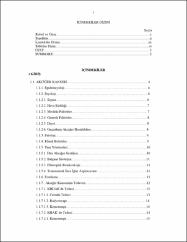| dc.contributor.advisor | Eşme, Hıdır | |
| dc.contributor.author | Berk, Çiğdem | |
| dc.date.accessioned | 2015-04-14T06:48:26Z | |
| dc.date.available | 2015-04-14T06:48:26Z | |
| dc.date.issued | 2007 | |
| dc.date.submitted | 2007 | |
| dc.identifier.citation | Berk, Çiğdem. Akciğer Kanseri Olduğunu Bilen ve Bilmeyen Akciğer Kanserli Hastaların Yaşam Kalitesinin Karşılaştırılması. Afyonkarahisar: Afyon Kocatepe Üniversitesi,2007. | en_US |
| dc.identifier.uri | http://hdl.handle.net/11630/3810 | |
| dc.description.abstract | Kanser gibi ölümcül bir hastalığın tanısının kişinin yaşam kalitesi üzerine çok büyük etkileri olacağı ve kişiyi yıkacağına şüphe yoktur. Kanserin sadece kesin sonuçlu bir olay değil, ayrıca sürekli belirsizlik, hastalık veya tedavinin potansiyel yan etkileri ve o andaki psikolojik konularla karakterize edilmiş sürekli bir durum olduğu bilinmektedir. Bu yüzden geçmişten bu yana hastalara kanser tanısının söylenmemesi gerektiğine dair bir inanış vardı. Şu anda bu durum değişti. Dünya genelinde yaygın kanserlerden biri olan akciğer kanserinde yaşam kalitesi hayatta kalma kadar anlaşılmalıdır. Çalışmamızda hastaların demografik durumunu ölçen forma ek olarak, yaşam kalitesini ölçen standart iki anket (EORTC QLQ-C30 ve QLQ-LC13) kullanıldı. EORTC QLQ-C30 hastaların fonksiyonlarını, genel yaşam kalitesini, hastalık ve tedavi ilişkili semptomları hakkında 30 madde içeren kanser odaklı bir test, EORTC-QLQ-LC13 akciğer kanseri semptomları, tedavi kaynaklı yan etkilerini içeren 13 maddeli bir alan odaklı testti. Bu anketler kanser tanısını bilen ve bilmeyen hastaların yaşam kalitesi puanlarını elde etmek için kullanıldı. Toplamda 70 hastaya bu çalışma uygulandı. Bunlardan 28 (%40) tanısını bilen hasta 42 (%60) tanısını bilmeyen gruptandı. Hastalık halinde fiziksel, ruhsal, sosyal ve gündelik faaliyetlerin tam bir iyilik halinde yürütülebilmesi,
hastalıkların kontrol düzeyi ile sağlık statüsü birebir ilişkilidir. Bir hastalığın ve ona bağlı tedavinin hastada yarattığı işlevsel etkilerin hasta tarafından öznel biçimde algılanışı yaşam kalitesini etkilemektedir. Hastanın yaşadığı kültürel yapı ve değerler sistemi bağlamında hem kendi amaçları, beklentileri ve endişeleri açısından, hastalığını bilip bilmemesi yaşam kalitesini algılayışıyla birebir ilgilidir. Sonuç olarak bu çalışma ile hastalığın her aşamasında bilgilenme gereksinimi göz önüne alınarak uygun eğitim ve sosyokültürel düzeydeki hastalara, kanser tanısının söylenmesi gerektiği sonucuna varıldı. | en_US |
| dc.description.abstract | There is no doubt the diagnosis of a life threatening disease such as cancer is devastating and has an enormous effect on one’s quality of life. It is argued that cancer is not just a single event with a certain end but a permanent condition characterized by ongoing ambiguity, potentially delayed or late effects of the disease or threatment, and concurrent psychological issues. Thus historically there was a belief that a patient should not be told about his or her cancer diagnosis. At present this has changed. In recent years there has been considerable attention on how to break ‘bad news’ from a patient’s perspective. Given that lung cancer is
one of the common cancers worl-wide, on the quality of life as well as survival require to be understood. Quality of life was measured using two standart questionnaires: The European Organization of Life Qustionnaire(EORTC QLQ-C30) and its lung cancer supplementary qestionnaire QLQ-LC13 in addition to a study demographic status. The European Organization of Life Qustionnaire(EORTC QLQ-C30), a core cancer specific questionnaire containing 30 item patients’ functioning, global quality of life, disease and The EORTC Lung Cancer Questionnaire (EORTCQLQ-LC13), a site specific questionnaire consisting of 13 items on lung cancer symptoms and its treatment related side-effects. Comparison was made in quality of life scores between who knew their cancer diagnosis and those who did not. In all, 70 lung cancer patiens were interviewed. Of these, 28patients (%40) knew and 42 (%60) did not knew their cancer diognosis. Looking at the scores fort he scores fort he two groups clearly indicate that these patients even at the pre-diagnosis stage had several health problems as well as symptoms related to cancer.The intention here is to show that knowing or not knowing one’s cancer diagnosis does not make any significant difference to the patients’ responses to a quality of life questionnaire.Whith regards to patients’ symptom scores, again there were no significant differences between the two groups, indicating that the knowledge of their cancer diagnosis did not lead to an overestimation of symptoms by patients who knew they had developed lung cancer. We, there argue that assesment of quality of life in lung cancer patients should be integrated into clinical practice and evaluted prospectively. | en_US |
| dc.language.iso | tur | en_US |
| dc.publisher | Afyon Kocatepe Üniversitesi, Sağlık Bilimleri Enstitüsü | en_US |
| dc.rights | info:eu-repo/semantics/openAccess | en_US |
| dc.subject | Akciğer Kanseri | en_US |
| dc.subject | Tanıyı Bilme | en_US |
| dc.subject | Doğruyu Söyleme | en_US |
| dc.subject | Yaşam Kalitesi | en_US |
| dc.title | Akciğer kanseri olduğunu bilen ve bilmeyen akciğer kanserli hastaların yaşam kalitesinin karşılaştırılması | en_US |
| dc.type | masterThesis | en_US |
| dc.department | Afyon Kocatepe Üniversitesi, Sağlık Bilimleri Enstitüsü, Hemşirelik Bölümü | en_US |
| dc.relation.publicationcategory | Tez | en_US |



















